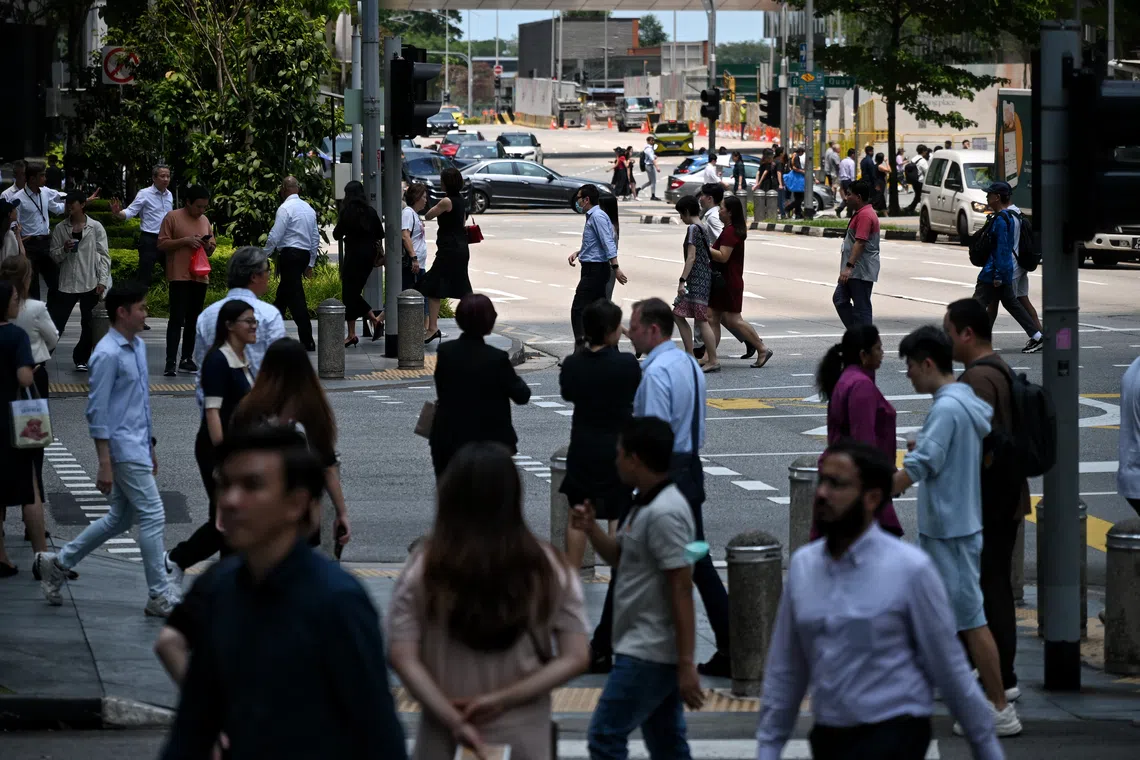‘Bloodied onslaughts’: Experts warn of AI’s growing impact on office jobs
Sign up now: Get tips on how to grow your career and money

Jobs in Singapore will likely not be spared, experts said.
ST PHOTO: KUA CHEE SIONG
Follow topic:
SINGAPORE - More job cuts are on the horizon as businesses prioritise artificial intelligence (AI) transformation, including the automation of administrative and coordination tasks, said human resources experts.
The latest cuts came from Amazon, which announced on Oct 28 that it was making 14,000 corporate jobs redundant globally amid a wider adoption of AI internally.
Jobs in Singapore will likely not be spared, with data entry, basic coding, administrative support, reporting and coordination roles the most at risk due to AI disruption, said experts. They also noted that most firms had already addressed the post-Covid-19 manpower bloat.
“We must be ready for bloodied onslaughts here as AI accelerates displacement in automatable tasks, hitting routine cognitive work hardest,” said Dr David Leong, chief executive of HR consulting firm PeopleWorldwide.
Since AI excels at entry-level white-collar jobs, half of all data entry, basic coding and admin support, among others, could be gone in five years, he said.
AI dashboards that provide real-time insights will also replace many middle management roles, Dr Leong added.
The massive cuts at Amazon, attributed to efficiency gains from AI, follow similar layoffs announced in 2025 by software company Salesforce, social media giant Meta and airline Lufthansa Group.
Figures from personal finance and trading education platform RationalFX point to over 200,000 jobs lost in the global tech sector in 2025
Mr David Blasco, country director at recruitment agency Randstad Singapore, said that AI transformation will affect industries in different ways.
In the tech sector, the impact of AI is more pronounced as firms tend to be early adopters of automation and AI-driven solutions.
“This positions them to sandbox and implement technologies that can rapidly replace certain functions, especially middle-skilled or white-collar positions,” said Mr Blasco. “At the same time, tech companies face constant pressure to optimise efficiency and profitability, while balancing the significant upfront cost of AI investment before realising measurable cost savings.”
In contrast, sectors such as corporate banking and healthcare place greater value on human intuition and judgment, which are capabilities that AI has yet to fully replicate, Mr Blasco added.
He also said that he is seeing more roles being redesigned to meet demands for greater specialisation and advanced skill sets.
For example, client-facing roles are increasingly adopting AI-powered software and tools to analyse data more efficiently, giving teams more time to focus on personalised solutions to client needs.
Another example is in transactional surveillance and banking compliance, where machine learning is being used to identify high-risk crime patterns with vast datasets – a task that was traditionally done manually. With AI integration, workers can be more efficient in identifying risks in real time to intervene.
Experts said that job cuts in 2025 are also meant to equip firms for new business opportunities.
“What’s driving investor enthusiasm, corporate valuations and stock performance is confidence in the transformative power of artificial intelligence,” said RationalFX data analyst Alan Cohen.
Dr Leong said: “It’s more of a manpower reallocation to stay competitive in an AI arms race.”
Mr Cohen noted that global trade tensions and US tariffs are also creating uncertainty and increased costs that further accelerate workforce reductions.
The silver lining is in AI development, data science, cyber security and product strategy, as these require some form of human oversight, he said.
Mr Blasco said there is also a strong demand for operations-critical roles like cyber security, as companies strengthen their defence against growing volumes of complex digital threats.


